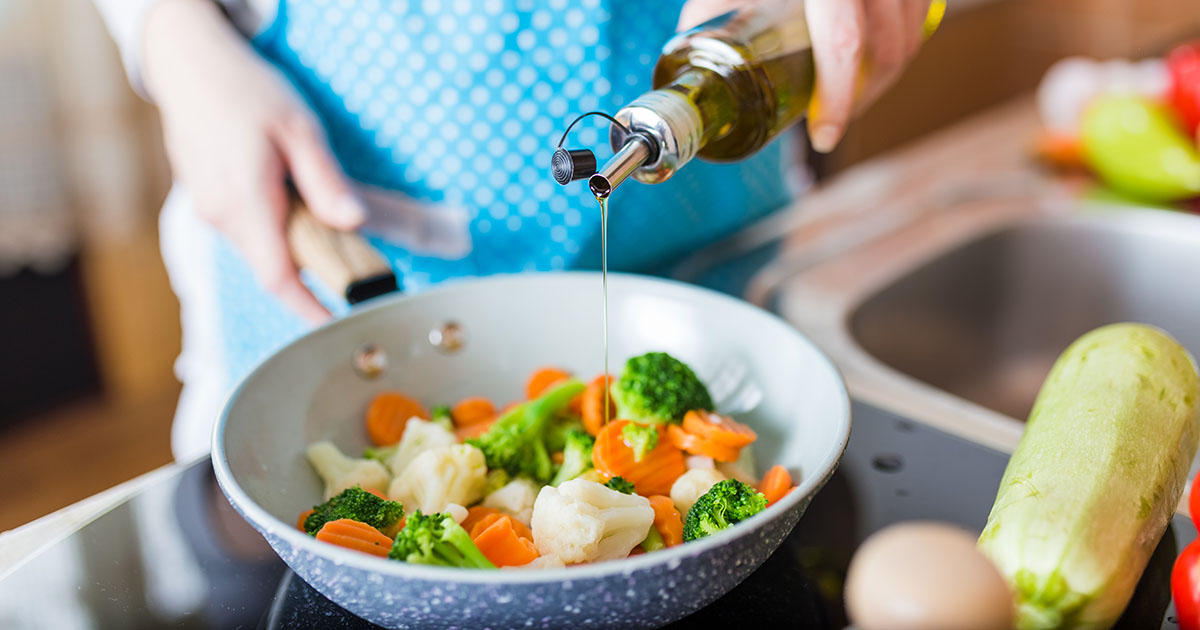In the kitchen with a dietitian: Learn how to cook favorite foods to boost nutrient content

Lauren Manaker, MS, RDN, LD, CLEC - registered dietitian | Feb. 2021
We all know that eating a diet rich in fruits, veggies, beans, nuts and lean proteins is important for so many health reasons. From cancer prevention to immune support, the health benefits of eating a proper diet appear to be endless.
But does the way that your foods are prepared affect the nutrient content? It sure can! From boiling to sautéing, different preparations can affect the vitamins and minerals naturally found in certain foods.
Here is what you need to know about how cooking certain foods can impact nutrients, and what you can do about it.
Heat can enhance the absorption of nutrients in some foods.
Heat can change the composition of proteins in your food. And in some cases, that can result in making the digestibility and absorption of that food enhanced.
For example, heat has been shown to enhance the digestibility of the protein found in eggs. So, although eating an undercooked poached egg has the same protein content as a fully cooked egg on paper, the amount that is actually absorbed may differ slightly.
Certain antioxidants are more available for absorption once food is heated. In the case of lycopene, an antioxidant that is found in many red and pink foods like tomatoes and watermelon, the nutrient availability appears to be enhanced when the food is heated.
Essentially, the cellular membranes are disrupted by the heat, thus allowing lycopene to be released. So, opting for slow-cooked tomatoes over a fresh one may result in your body being fueled with more of this important antioxidant.
Generally speaking, cooking can predigest starches, improving their nutritional availability once consumed.
However, the method of cooking can cause slight differences in the nutrient content of some foods.
Boiling foods rich in water-soluble vitamins can cause the nutrients to leach out.
Simply put, water soluble vitamins – think vitamin C and the B-vitamins as examples – are those that can dissolve in water. Foods rich in these important vitamins include many fruits and vegetables.
While fruits and vegetables are rich in water soluble vitamins, once they are heated in water, water-soluble vitamins can leach into the water and move away from the actual food. So, boiling, sautéing and simmering can be the cause of reducing the nutrients that you actually get into your body.
In one study, both boiling and stir-frying broccoli, a vegetable rich in certain B vitamins resulted in significant losses of chlorophyll and vitamin C with significantly decreased proteins and soluble sugars. Microwaving food did not show the same effect.
To save those nutrients, don’t be so quick to toss the liquid after you boil your carrots, cabbage or other cooked veggie. Use that remaining liquid in your soups, smoothies or even as a drink on its own to reap the benefits of the nutritious byproduct of your cooking.
Broiling instead of roasting nuts can make a difference in the nutrient content.
Broiling nuts instead of roasting nuts may sound like a small technicality. But the methods can result in very different nutrient contents in certain nuts. In fact, according to the USDA, roasted nuts tend to have less lutein, lycopene, beta carotene and vitamin A when compared with the broiled counterpart.
And roasted nuts vs. raw nuts come up with some nutritional differences as well. According to one study, slow-roasting nuts resulted in more oxidized fat when compared with raw. Oxidized fat can lead to the formation of free radicals, which can result in some negative health outcomes.
If you have the option, broil vs. your walnuts, hazelnuts, almonds and other nutrient-rich nut options. Or better yet, eat them raw.
When opting for dried, frozen, canned or freeze dried produce, you may experience some nutritional differences.
Leaning on alternatives to fresh produce is a healthy choice for many reasons. Preserved foods have a longer shelf-life and sometimes don’t even need to be refrigerated.
Depending on the temperature used for the preserving method, the vitamin C content may be diminished in dried fruit. And choosing frozen produce over other options (even fresh!) may provide you with more nutrients.
In fact, when compared with fresh apricots, the frozen option had more antioxidants, beta-carotene, vitamin C and phenols, according to one study.
Key Takeaway
Eating a healthy diet is always a good idea. But even with the best intentions, you may not be eating as many nutrients as you think depending on how the food is prepared. Along with eating a diet rich in nutrient-dense foods, supplementing with a high-quality multivitamin can help ensure that you don’t have any major nutrition gaps. Choosing a multi made with real food and added nutrients like MegaFood is a perfect complement to your healthy lifestyle.

